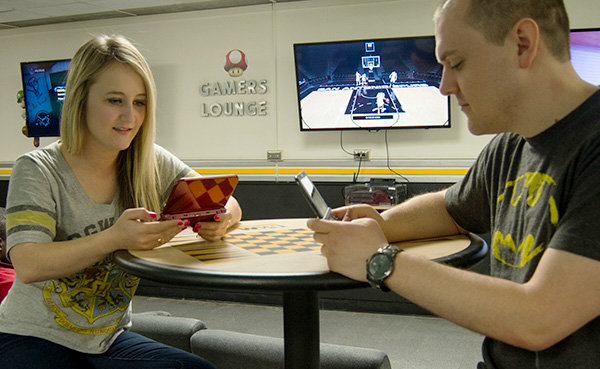
Misogyny is a defining characteristic of gaming culture, even though half of the players now are female.
Women who game face unwelcome sexual advances and crude condemnations of their skills, say Benjamin Baker and Arrington Stoll, UWM doctoral students who recently completed a study on the topic.

“Video games have historically been steeped in hypermasculine culture,” said Baker, 31, a lifelong gamer. “Games have been developed by men and marketed to men.”
While the audience has evolved, the sexualized characterization of women has not. The streets, dungeons and battlefields are more realistic than ever but still populated by brawny males and a few women clad in cleavage-revealing costumes.
Stoll, 28, began playing about six years to stay connected with her younger brother when he went off to college. She played a character with masculine traits in the online Xbox 360 game Call of Duty, but her feminine username and voice were immediate giveaways (players wear headsets and communicate with one another).
“It was terrible at first,” said Stoll, who was berated in crude language when, as a newcomer, she didn’t perform well. “My brother would stick up for me,” she said. “He’d say ‘Hey, that’s my sister!’”
The two agreed that the study benefitted from having a man and woman involved.

“You have to look at this from an unbiased viewpoint,” Stoll said. “Some might have said that of course I’d come to a certain conclusion. He (Baker) brought another viewpoint.”
Twenty gamers between the ages of 18 and 52 participated in the study, describing similar experiences. All had assigned popular gaming names to preserve anonymity.
“(M)ale players will sometimes be very rude and inappropriate in general chat channels – making comments about things like rape, for instance, or racial comments,” wrote one player.
Another respondent talked about harassment that went further. “When my character walked away, they followed me and continued to emote that they were restraining me or touching me in a sexual nature. I felt violated and upset…”
Yet another talked about being stalked after giving identifying information to a male player.
Media critic and blogger Anita Sarkeesian experienced the wrath of misogynists last year when she waded into the culture wars of the gaming world. Some players took the argument offline and threatened Sarkeesian with rape and death. At least one of her speaking engagements was cancelled because of threats of mass violence. That incident and another involving a Washington Post blogger who faced similar scorn after writing about the state of gaming became known as Gamergate.
But there can be another side to the gaming world.
Female gamers spoke warmly about the community they found online. Baker said he knew of one couple who met through online gaming, connected in real life and married.
“For every negative experience, there are far more positive,” he said. “I’ve talked to people who have met in these games and have become friends even though they live on the other side of the country.”
Baker and Stoll hope to have the paper published in a publication read not just by the gamers but also the gatekeepers, such as developers and producers, of the games. “That way it could have more impact as we continue to talk about the issues,” Baker said.




